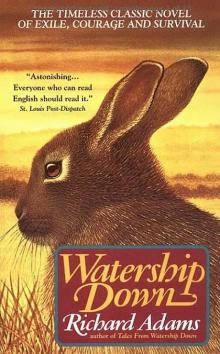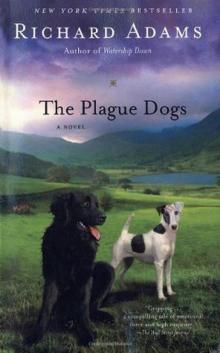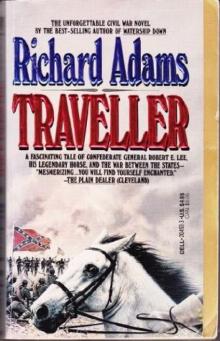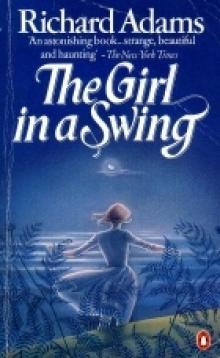- Home
- Richard Adams
Traveller
Traveller Read online
Also by Richard Adams
Watership Down Shardik
The Plague Dogs The Girl in a Swing The Iron Wolf and Other Stories Maia
TRAVEL
Voyage Through the Antarctic (with R. M. Lockley)
PICTURE BOOKS IN VERSE
The Tyger Voyage The Ship's Cat
NATURE
Nature Through the Seasons Nature Day and Night (both with Max Hooper)
TRAVELLER
TRAVELLER
a novel by Richard Adams
(c) 2014 Richard Adams
Richard Adams has asserted his rights in accordance with the Copyright, Designs and Patents Act 1988 to be identified as the author of this work.
Published by Watership Down Enterprises
First published and printed in 1988
First published in eBook format in 2014
ISBN: 978-1-78301-582-5
(Printed edition ISBN 0-394-57055-3)
All rights reserved under International and Pan-American Copyright Conventions. By payment of the required fees, you have been granted the non-exclusive, non-transferable right to access and read the text of this e-book on-screen. No part of this text may be reproduced, transmitted, downloaded, decompiled, reverse-engineered, or stored in or introduced into any information storage and retrieval system, in any form or by any means, whether electronic or mechanical, now known or hereinafter invented, without the express written permission of the Publisher.
All names, characters, places, organisations, businesses and events are either the product of the author's imagination or are used fictitiously. Any resemblance to actual persons, living or dead, is purely coincidental.
eBook Conversion by www.ebookpartnership.com
Summary: Examines the events of the Civil War through the eyes of General Robert E. Lee's closest companion and devoted horse, Traveller.
1. Traveller (Horse)--Fiction. 2. United States-History--Civil War, 1861-1865--Fiction. 3. Lee, Robert E. (Robert Edward), 1807-1870--Fiction.
[1. Traveller (Horse)--Fiction. 2. Horses__Fiction. 3. United States--History--Civil War, 1861-1865--Fiction. 4. Lee, Robert E. (Robert Edward), 1807-1870--Fiction] I. Title. PR6051.D345T7 1988 823'.914 [Fic] 87-46187
To my friends
Donald and Judy Lineback
[This Bucephalus had, in the past, shared many a hardship and many a danger with Alexander, and had never been mounted by anyone else--for he scorned all other riders; he was great in size and noble in spirit.]
I dreamt last night that there was wind and rain.
I got up and looked out, but all was strange; A muddy track across a wooded plain;
A distant tumult; angry cries, exchange
Of fire. And then, out of that dreadful night, Appeared a scarecrow army, staggering,
Defiant, famished. In the quenched starlight They marched on to their bitter reckoning.
Their sleepless, bloodshot eyes were turned to me.
Their flags hung black against the pelting sky.
Their jests and curses echoed whisperingly, As though from long-lost years of sorrow-- Why,
You're weeping! What, then? What more did you see?
A gray man on a gray horse rode by.
Contents
Notes and Acknowledgments
Preface
I
II
III
IV
V
VI
VII
VIII
IX
X
XI
XII
XIII
XIV
XV
XVI
XVII
XVIII
XIX
XX
XXI
Notes and Acknowledgments
Tom the Nipper and Baxter, the domestic cats of this story, were regarded as belonging to Mildred, Lee's youngest daughter, known in the family circle as "Life." Lee's son, Captain Robert E. Lee, Jr., in his Recollections and Letters of General Robert E. Lee, quotes a letter of the General to Mildred, dated December 21, 1866, in which he says, "Our feline companions are flourishing. Young Baxter... gives catlike evidence of future worth... and is strictly aristocratic in appearance and conduct. Tom, surnamed 'the Nipper,' from the manner in which he slaughters our enemies, the rats and the mice, is admired for his gravity and sobriety, as well as for his strict attention to the pursuits of his race." Captain Lee goes on to relate the story of the cat attracting attention by miaowing outside the house during a stormy night and then climbing up the crutch that the General held out of the window.
Traveller's evening chats with Tom Nipper are imagined as beginning in April, 1866, and continuing intermittently until October, 1870. In the story, most of these can be more or less dated from the daily events to which he refers. For example, we know that the mare Lucy Long was restored to the Lee menage on December 21, 1866. Lee's riding holiday with Mildred, Traveller and Lucy Long (when the ferryman refused Lee's money) took place in late June, 1867; the whistling-back incident at the canal-boat landing happened in July of the same year, and so on.
Accounts of the injury to Lee's hands on August 31, 1862, vary in detail, but I have relied on that of Colonel Walter H. Taylor, an eyewitness, in Chapter 8 of his General Lee, 1861-1865.
Anecdotes of Lee and Traveller are, of course, innumerable. The books I have most enjoyed are Douglas Southall Freeman's R-E. Lee, the above-mentioned book by Captain R. E. Lee, Jr., and Charles Bracelen Flood's Lee: The Last Years. Also of value are J. William Jones's Personal Reminiscences, Lee's own Life and Letters and Colonel A. L. Long's Memoirs.
In particular, I acknowledge with admiration and gratitude the invaluable instruction I have received from Lucy Rees's book The Horse's Mind and also from her personal advice on equine matters.
On Richmond's illness I had excellent guidance from Mr. G. H. Gilbert, M.R.C.V.S.
The authenticity of Traveller's Virginian idiom I owe almost entirely to Dr. Donald J. Lineback and to Dr. William L. Tazewell.
Friends who have given encouraging support and help include particularly my editor, Bob Gottlieb; and Barrett Clark, who found me scarce source books that I could not otherwise have obtained.
Finally, I am deeply grateful to my secretary, Mrs. Elizabeth Aydon, who not only typed the manuscript most accurately but corrected and checked it in detail with admirable perception and discernment.
Preface
by Lucy Rees, author of The Horse's Mind
Robert E. Lee surrendered the Confederate Army of Northern Virginia to Ulysses S. Grant on April 9, 1865. On September 18th of that year, Lee, riding his horse Traveller, arrived in Lexington, Virginia, to take up the appointment of President of Washington College, which he had accepted at the invitation of the rector and trustees. From that time until Lee's death, in October, 1870, master and horse, living at Lexington, continued and, if anything, deepened the affectionate relationship they had developed during the war. Traveller died in June, 1871.
That the relationship between Lee and his horse was one of exceptional mutual trust and confidence is well documented. Lee himself wrote: "A poet... could... depict his worth and describe his endurance of toil, hunger, thirst, heat and cold, and the dangers and sufferings through which he passed. He could dilate upon his sagacity and affection and his invariable response to every wish of his rider. He might even imagine his thoughts through the long night-marches and days of battle through which he has passed."
What Traveller felt has not been chronicled before. How legitimate is the attempt to do so? Though his experiences were extraordinary and his stamina and intelligence well above average, Traveller must have shared the basic psychology common to all horses. His fears and pleasures, his eternal hopefulness, his striving to interp
ret events beyond his comprehension and his convinced misunderstandings will be as be as familiar as the smell of a horse to any rider. His peculiarly equine point of view, so accurately portrayed here, is as well supported by hard fact as the historical events that surrounded it.
What may not be so familiar is the complete faith that Traveller showed in Lee, and his ability, again well documented, to interpret Lee's slightest wishes without any apparent command or coercion. Traveller's descriptions of how it felt to him and of his lack of confidence in less sensitive hands are also deeply convincing.
TRAVELLER
I
Early spring, 1866. Lexington, Virginia: a small town in a rocky upland valley below the Blue Ridge Mountains. It is a lonely, remote place, difficult of access, the choice lying between a twenty-three-mile journey on a bad road from the railroad station at Goshen, and twelve hours by boat from Lynchburg along the James River and Kanawha Canal. A somewhat austere society--Presbyterian for the most part--its well-scrubbed, sober character reflected in the blue limestone streets running between red-brick houses with stone facings, plain pillars and trim cedar hedges bordering brick-paved pathways. Although it is night now, the half-moonlight is enough to reveal the indigent and dilapidated appearance of the place - chipped paintwork, ill-pointed walls, sagging gates and broken fences. The town has no bank and hardly needs one. On the ridge above it rise the smashed and grimy walls of the Virginia Military Institute, raided by the Federals two years before.
The Washington College campus shares this general look of wear and tear. The violets are in bloom, certainly, and the leaves are already burgeoning on the trees--acacia, sweet maple, chestnut and sycamore. But there is an untended look to the lawns, the shrubs and the railings, suggesting not so much neglect as sheer shortage of money and hence of tools and human hands, black or white. The President's house, a handsome, two-storied building with sash windows and a flight of eight steps rising to a columned portico, is dark now--not a light showing--for the President encourages early nights and himself habitually goes to bed at ten. Here and there, a few students are crossing the campus on their way back to their rooms. Several look curiously mature for students; and so they are, being demobilized soldiers and, for lack of other clothes, still wearing patched and mended gray uniforms from which the insignia and badges of rank have been removed.
A black stableman, clapping his arms for warmth--for the air is somewhat chilly--makes his way across the yard behind the big house and, his day's chores done, enters his lamplit cabin and shuts the door for the night. A slim, quick-trotting young cat, intent upon rats, slinks along a wall and into the stable by way of a drain-hole. The stable is sound and snug--one of the best-repaired buildings on the place--and not a draft disturbs the straw-bedded stall where a powerful, nine-year-old gray gelding, of superb if veteran appearance, lies sleeping. He stirs.
The Blue men! The Blue men! They've got round behind us, they're in among those thick trees! The guns--the guns--I shall go mad! The ground's shaking! Run! Run! A horse that's afeared has to run, what else?
Pressure of Marse Robert's knees; steady hand smoothing my neck. "Easy, Traveller, easy! So, Colonel, what ought we to do?"
Horses plunging, screaming. That mare's been blowed to shreds. She ain't dead--she's squealing, struggling. "Steady, Traveller!" The smoke! I can't see! I can't see anything! Stand still! Must stand still! The Blue men are coming! No, it's the Yell! The Yell! Over there--in the trees! It's Cap-in-His-Eyes is coming!
Oh, I--my legs! This straw--Where am I? I'm in the stable! It was jest another of those dad-blamed dreams! No Blue men--not any more. No guns. I'm all a-sweat. I'd better stand up.
What's that? Who's that moving over there? Who are you? Oh, it's you, Tom Nipper, drat you! Come on out o' that there straw! Hunting rats? 'Say you're hunting rats on my 'count? Get along with you! It's on your own account. It's you that starts me on these durned dreams, comin' prowling in here jest when I've got to sleep, pushing up agin me in the straw 'cause you want to keep warm. That a rat you got there? Good fella! Well, I won't say you ain't a good cat. 'Fact, I heared Marse Robert say as much yesterday to your mistress. "That's a good cat you got there, Life," he said. "Makes a mighty good friend for Traveller, too."
Well, now, you settle down quiet. No, right there, where I can feel you. No more prowling around, giving me bad dreams. Tell me how you been getting along.
Yes, all right, I've heared that story 'bout you an' Marse Robert. Baxter told me. How you was miaowling round outside his bedroom in the rain, and he got up and opened the window, an' it was too high for you to jump in, so he held out one of the old lady's crutches and you climbed up it. Yeah, and he got wet doin' it, too. I'll say some of you cats have got 'nuff sass to jine the Texans! Fancy the likes of you getting Marse Robert out of bed and leaning out in the rain! And that Baxter! Hardly more'n a kitten, but 'fore long he'll be sassy as you. You're all the same: never been real hungry, never been on a march, never gone ary a mile in the dust, never smelt the smoke--never heared a gun, even.
Well, I guess it ain't your fault. Do you know, Tom, there was a time when I'd never heared a gun? Can you believe that? A time when I was a little foal, all head an' legs, alongside o' my dam? Well, and to begin with, I didn't even really know she was my dam. The first thing I can remember--the first thing at all--is pushing my nose into the dark shadow between her legs, to get at the milk. All I knowed was I wanted the milk, you see. But there was another mare in the field, an when I went and pushed up to her, 'course she druv me off. That's how you larn who's your dam. To begin with you jest want to push into the shadow between anything up-an'-down. Why, I've even seed a newborn foal push his nose into a deep crack in the bark of a tree!
It was all milk and green grass in those days, and larning to smell the difference between the kinds of grasses an' plants there was to eat. We do jest about hate anything bitter, you know, and soon as I started grazing, I was larnng to sniff out which was the bitter plants and let 'em alone. I'd never have thought then that there could be sech a thing as not getting 'nuff to eat. 'Course, you don't eat grass, Tom, else you'd have a long nose 'stead of a flat 'un. A horse can poke his nose into the grass, you see, and still keep looking all round at the same time. No horse is happy when he can't see what's around him. You cats can trap a smell up your nose and hold it, though, can't you, good as any horse? I seed you opening your mouth and wrinkling up your face when you've smelt some strange cat's piss along the fence out there.
'Course, it warn't long 'fore I had to larn some manners in dealing with older horses. That was a big field, where I was raised. In those days I thought it was the whole world, with the split-rail fence all round it, the shed at the top of the slope and the oak trees an' the big pond down the bottom. There was a plenty of horses there besides me and my dam--a good many of 'em born and raised there, like me. When you're a foal, you've got to larn to respect your elders and behave right. You've seed that puppy roll over in front of the old dogs, haven't you? Well, when you're a foal you don't roll over; you drop your ears an' stretch out your neck, and then you have to sort of draw back your lips and show your teeth while the older horse sniffs at you. Yeah, but as you grow up you soon stop that. I'd finished mouthing at older horses--oh, after my first year, I guess.
Of course, Tom, we grow up fast, you know. Faster'n a cat can imagine, I'm sure of that. You was a blind kitten, warn't you, crawling about for days in a basket? Why, the same day we're born we can stand up and walk, and follow along with our dams. Then there's the flies, of course. Don't take you long to larn to use your tail on them fellas. I've always wondered why there had to be flies in the world, but the way I figure it now, it's the Blue men turn into flies--you know, when they've finished bein' Blue men. Must be, 'cause there's always too many of 'em. Your first day, you start nibbling the grass; nibble a bit o' dung, too--that's important, else your stomach can't work, you know. You cats don't really make friends, do you? I've noticed: most other
cats--you jest can't see 'em off fast 'nuff. Now horses--horses need friends. Who's going to keep the flies off your face and out of your ears? Who's going to get your tangles out and clean you up? And you gotta do the same for him, 'course. Who's going to keep a lookout behind while you've got your head down, grazing? There was plenty of other foals in that big field, and as I began to stray away from my dam I soon got to racing and playing and pushing around. I had a few tussles--nothin' bad, though. But I soon larned where I stood, an' it was mighty high up. I could tell that much, jest from the way the men kind of seemed to be weighing me up while they was leaning over them rails and looking us over.
Back in those days we-all did jest about nothing all day. If only I'd 'a knowed! If only I'd 'a knowed! Grazing, and jest loafing around. Standing head-to-tail with a friend, swishing the durned flies, stretching, yawning, scratching. I had a friend called Ruffian. Sorrel, he was. And years later, that night in the mud--that night in the mud when Marse Robert--well, never mind 'bout that for now. What else do I remember?
I remember the woods along the top end of the field, how the leaves came out in the spring, dogwood and redbud; and over the fence, in the wood, there'd be little white lilies; and down in the pond there was a pink, flurry kind of a flower used to grow in clumps in the shallow water. I tried eating it once, but it warn't no use. That's how you find things out--try everything. 'Quisitive, Tom. A good foal's got to be 'quisitive. Why, I can remember a young filly--Moonlight, her name was--no older'n me, actually teaching herself to drink. Wouldn't never think you had to larn that, would you? First she stuck her nose right in deep an' ended up spluttering a noseful. Then she tried nibbling the water, as if it was grass. 'Took her--oh, a day or two--to larn to drop her ears and pull her nostrils back, the proper way.
We used to larn most things by playing, of course, same as you cats do. Sure, I've seed you and young Baxter playing around in the yard, jumping on the leaves and chasing each other an' all the rest of it. First of all I used to play with my dam--Flora, she was called--nibbling her tail, bumping her around. She took it all easy--well, she knowed I'd soon be off to play with the other foals, kicking around, pulling faces and swishing tails. You've gotta larn to get on with other horses, else you end up worse'n Richmond. Well, I ain't told you 'bout Richmond, Tom, have I? I will, sometime.

 Watership Down
Watership Down Tales From Watership Down
Tales From Watership Down Maia
Maia The Plague Dogs
The Plague Dogs Shardik
Shardik Traveller
Traveller The Girl in a Swing
The Girl in a Swing The Day Gone By
The Day Gone By Daniel
Daniel The Plague Dogs: A Novel
The Plague Dogs: A Novel